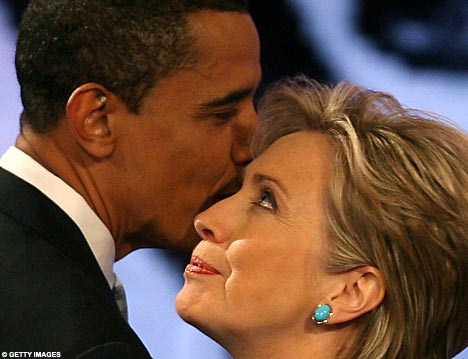Barack Obama
Related: About this forumThe Long Struggle
Yesterday I asked whether or not we're looking for a therapist-in-chief during this presidential race. That was based on some comments by Democratic strategists/pundits who said that Clinton is offering solutions while Sanders is "reflecting back their feelings to people." The assumptions underlying that assessment are that people are angry/afraid and candidates need to mirror those feelings to show that they "get it."
That's one of the many reasons why I found this excerpt from a book by Erin Aubry Kaplan to be so fascinating. As an African American woman, she is writing about her initial reaction to candidate Barack Obama back in 2007. In this quote, she is explaining why she hadn't been impressed with his 2004 speech at the Democratic convention, with it's emphasis on finding "strength in unity across party and ethnic lines."
I had grown up with a fiercely activist father, a soldier of the movement and a New Orleans native who believed in justice and equality for all, but he harbored no illusions about the depth of white American resistance to both. He was committed to changing laws and behaviors; changing hearts and minds was not a reachable goal. It depended too much on feelings, and in my father’s line of work and in his own life experience, feelings were unreliable, mercurial, even dangerous, for everybody concerned. Anybody talking about feelings as they related to justice and politics had his head in the clouds or was secretly averse to the real work needed for racial progress — work that was tough, unglamorous, and distinctly unsentimental. It was also lonely. Erasing differences and coming together across color lines as a way to effect change was one of those facile ’60s utopian ideas commercialized by companies like Coca-Cola that celebrated brotherhood and equality as the good feeling Americans get singing a song or downing a soda. Now that feeling had been resurrected as a serious message for a seriously disillusioned age that seemed to be always invoking the ’60s, minus its actual events and unfinished business. The sense of possibility, of transformation being eternally on the horizon, was the only use people had for the ’60s anymore. Mainstream politics had long ago stopped talking about its hard lessons and touted only hope and rainbows, talking up the idea of change rather than the mechanics of it.
In that quote is an explanation of why African Americans like Kaplan and her father don't find their feelings reflected in presidential candidates and probably wouldn't trust one who attempted to do so. You also see an understanding that the "real work" of change is "tough, unglamorous and distinctly unsentimental."
A lot of people have wondered why African Americans seem to be more supportive of Clinton's pragmatic approach than they are of Sanders' idealism (I know that's oversimplified, but bear with me). There are probably as many answers to that as there are African Americans. But themes do emerge. People like Kaplan and her father have learned some hard lessons about what to expect from white Americans and our politicians. The older generation still has memories of what it took to actually change segregation and dismantle the legal framework of Jim Crow. After all that, they find themselves almost 40 years later still having to assert that black lives matter, defend their right to vote, and fight to change our criminal injustice system.
Read More http://immasmartypants.blogspot.com/2016/02/the-long-struggle.html
"40 years later still having to assert that black lives matter, defend their right to vote, and fight to change our criminal injustice system."
yallerdawg
(16,104 posts)It was supposed to be about the most significant historical impacts in America over the last 200 years.
It was a very lengthy and detailed story about the long slog of lawyers like Thurgood Marshall who went through one court after another for decades, slowly and pragmatically changing America's laws, while Martin and Malcolm and so many others fought and died for change while this real change was going on in the background.
This is also now the story of the impact Barack Obama is having on America. It is quiet, no glory and fanfare, just a slow slog towards transforming America.
This is the story Hillary is telling us. To continue Barack's work, it is slow and detailed and pragmatic - it is not "thunder-bolts and lightning liberal progressivism."
It is 'moderate.' And measured. And successful.
Great post, she! ![]()
![]()
sheshe2
(87,897 posts)Sounds like an inspirational play, the slow slog to social justice.
Obama, dayum I am going to miss him. An incredibly intelligent man that despite the vitriol and the outright racist hate he has moved us forward. He has a quite calm about him. I remember in the beginning watching him in debates, he would pause before answering, almost seeming to stumble at the start of his answer. The first few times I panicked , then understood he was thinking, he always gave a well thought out response. I truly love this man and our Nation is better for having him as President.
I know Hillary and Obama had a shaky start during the campaign, yet they resolved their differences. They have a mutual respect for each other. If they can do this why the hell should anyone say any different.

Yes, she will continue and expand on what he as built.
Iliyah
(25,111 posts)I'm very proud of President Obama!
SleeplessinSoCal
(9,721 posts)Not one Republican in that gigantic field is capable of seriously addressing climate change and all the challenges coming with it, Wall Street reform, income inequality, a national religious "cold war" of choice, nuclear threats, deteriorating infrastructure and real national security. Plus a dozen other ongoing issues and the ones you didn't see coming.
Today I'm fearful of voter suppression and a turned off electorate. A very bad combo.
(I realize this is somewhat off topic, but it's gnawing at me 24/7. Sorry.)